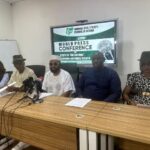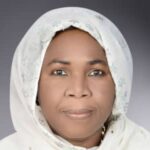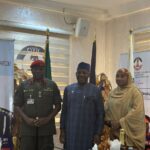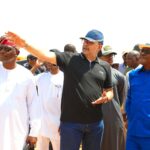By Oluwafunke Ishola
The National Identity Management Commission (NIMC) says the National Identification database shows a low coverage and gender gap in the registration project, considering the notion that there are more women than men.
The Director-General of NIMC, Mr Aliyu Aziz, said this during the Inclusion for all (I4ALL) Dialogue in Lagos.
The event has as it theme; “Digital ID for the Last Mile – Enabling Access to Digital ID for Rural Female Agricultural Workers”.
According to him, over 101 million persons have registered for the National Identification Number (NIN), while only 44 per cent enrollees are females.
Aziz said that a gender study conducted by NIMC and the World Bank, identified some of the barriers to accessing ID as lack of
awareness, none value or use of ID, accessibility issues.
Others are, time taken to
register, lack of documentation, biometric capture issues, among others.
He said that robust, inclusive and responsible foundational ID systems could be transformative for the poorest and most vulnerable population.
Aziz noted that would also enable the population gain access to basic health care, education and social safety
nets; facilitate financial inclusion and foster the empowerment of
people, including women and girls.
Similarly, Zaina Sore, Head, Capacity Development, International Institute of Tropical Agriculture (IITA), emphasised the significance of digital identity in empowering and deepening financial inclusion for rural women and transforming their livelihoods.
Sore who presented the findings from the targeted research study on “Access to Identity, Empowerment, Livelihood, and Financial Inclusion of Rural Female Agricultural Workers and Traders in Nigeria”.
She noted that many of the women engage in different agricultural activities and trading, particularly in the informal sector.
“It is important that we better understand their needs and challenges to tailor the services that will lead to greater inclusion and economic empowerment,” she said.
The study, commissioned to IITA by I4ALL, was carried out in the first quarter of the year in Kano, Oyo and Rivers States.
It revealed some new insights and validated pre-existing data insights from I4ALL’s analysis of the 2020 Enhancing Financial Innovation and Access (EFInA) A2F (Access to Finance) dataset.
“For instance, Kano State recorded higher levels of NIN ownership by 77 per cent among the respondent groups, compared to Oyo which has 58.1 per cent and Rivers with 46.6 per cent, contradicting our hypothesis of lower enrolment rates in the North.
“However, the research highlighted how socio-cultural norms can be used as a deliberate strategy to drive female enrolment in the North.
“The barriers to NIN enrolment remained consistent, from the cost of transportation to distance from enrolment centres and tedious enrolment processes,” she said.
Commenting on the findings, Chinasa Collins-Ogbuo, Convener and Head, I4ALL, said universal access to formal identification requires an intentional focus on the most vulnerable Nigerians – likely to be poor female farmers in rural communities.
Collins-Ogbuo said that NIMC had done a great job with the momentum achieved towards ID enrolment of Nigerians, stressing that it must be maintained.
“Reaching the last mile is the most challenging part; specific and targeted approaches must be designed and implemented to reach them successfully and leave no one behind.
“NIMC identity strategy clearly recognises the need to ensure that excluded populations are included in the enrolment process, and this research reinforces that need, demonstrating the urgency for action.
“The poorest excluded populations are most often the hardest to reach, and can be the most resistant to participation, but stand to gain the most from the range of government and financial services that inclusion enables,” she said.
She said that to achieve NIMC’s ambitious enrolment targets, all relevant stakeholders in the public and private sector must work together to ensure that the enrolment system reaches those who need access to the services the most; the vulnerable and marginalised.
“The Inclusion for all Dialogues event highlighted the importance of collective efforts in creating an inclusive and equitable society.
“By empowering rural female agricultural workers with digital identification, we can unlock their potential, enhance economic productivity, and drive positive change for the entire nation.
“Our aim is to cultivate a strategic platform of cross-cutting actors with a shared goal to uncover the links that exist between income level, identity ownership and financial inclusion in order to identify opportunities to accelerate the pace of digital financial inclusion,” she said.
According to Collins-Ogbuo, I4ALL remains committed to its mission of fostering financial inclusion for all Nigerians and will continue working with partners, stakeholders, and policymakers to address these pressing challenges.(NAN)(www.nannews.ng)
Edited by Olawunmi Ashafa












